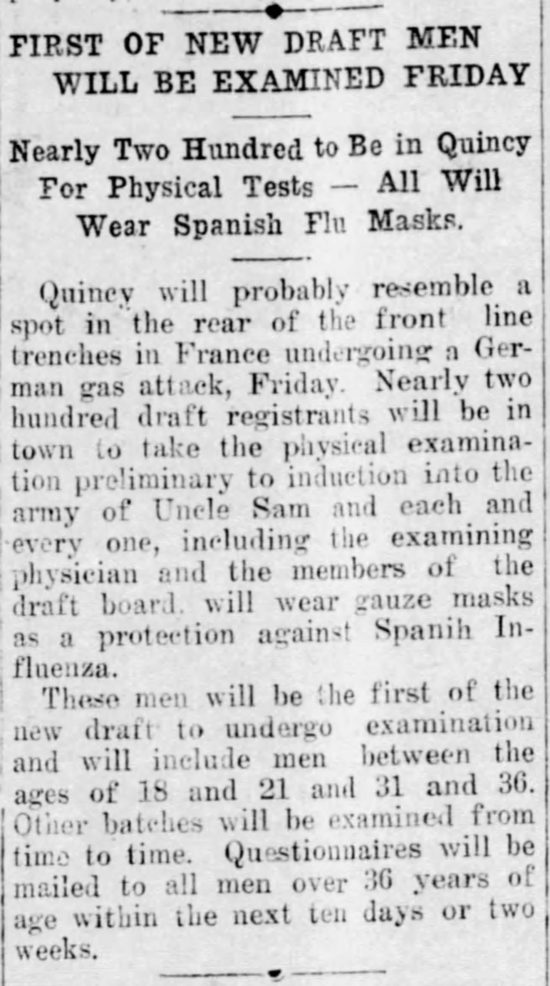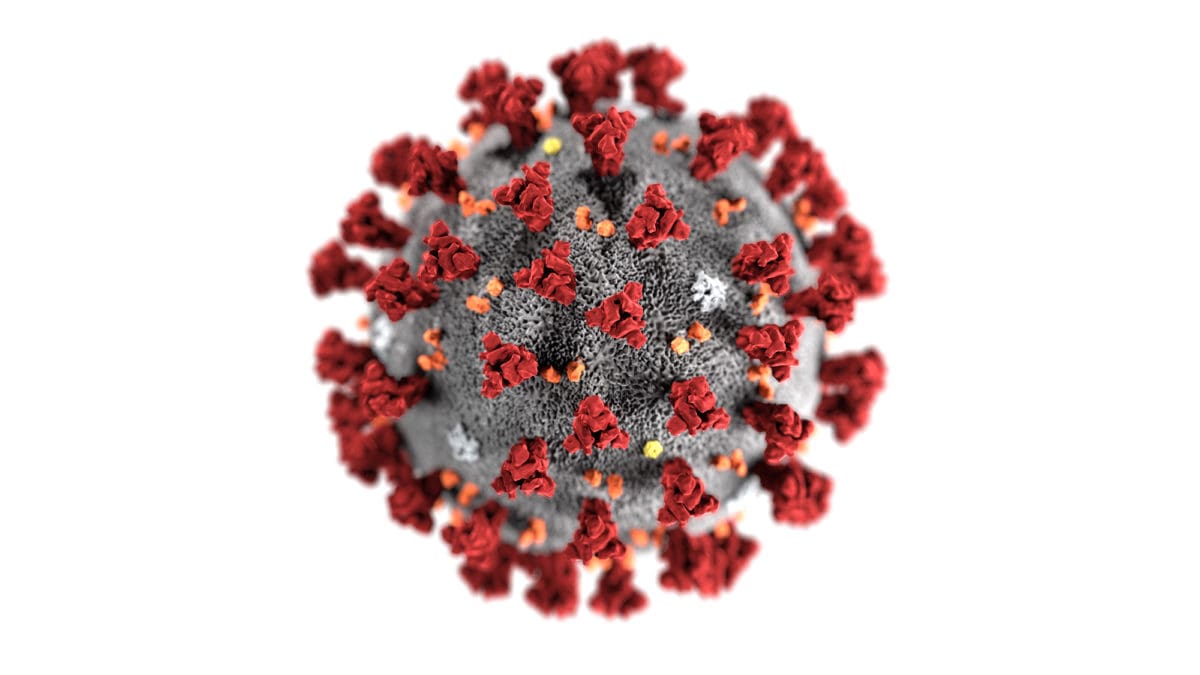I’ve been talking about it for awhile. I’m just one of many. First Things, the magazine that calls itself “America’s most influential journal of religion and public life,” is struggling. For me, it started with a broadside against the very reasonable David French by Sohrab Ahmari about a year ago. And then of late, the editor of First Things, R.R. Reno, has used the magazine to carry on a war against social distancing and most recently face masks. Yesterday, the crescendo was this series of tweets, now deleted from Twitter.
Reno today deleted his account from Twitter and did not file a daily Coronavirus diary on First Things as he has done most days during the pandemic.
By the way, in fact soldiers did wear masks. Or at least these recruits did during the 1918 Spanish Flu pandemic.
 Others have noticed. Evangelical historian Thomas Kidd tweeted earlier today.
Others have noticed. Evangelical historian Thomas Kidd tweeted earlier today.
Once the top intellectual outlet for religious traditionalists; now trashing people for trying to protect the ailing and aged from COVID-19. Has any American periodical ever fallen so far? #firstthings #ProLife
— Thomas S. Kidd (@ThomasSKidd) May 14, 2020
As I read editor Reno, he seems preoccupied with fear. He almost seems afraid to be afraid. In his tweets and articles, fear is the worst thing. Wearing a mask is a sign of cowardice to him. While I understand that fear is a negative emotion, some things should be feared. Fear is a natural part of our ability to adapt and respond to the demands of life. Fear can focus us on what is important.
In his war on fear, Reno has taken liberties with both history and science. In prior articles, Reno said in past pandemics, American citizens didn’t stop their gatherings, football games, and church services. Not true. In the 1918 Spanish Flu pandemic, many of the very same measures being taken now were taken then.
In his Coronavirus journal entry on May 12, Reno wrote:
Experts estimate that one-third of the residents of New York City have had the disease—a collective condition that makes it nearly impossible for an outbreak of significant magnitude to sweep through the city again. Yet we’re locked down, with no end in sight.
Actually, experts estimate that it would take 60% of the population to be infected for herd immunity to prevent an outbreak. In fact, we don’t know for certain that immunity occurs in all cases of COVID-19, and we don’t know for sure that the antibody tests are reliable. Even if they are and 30% is a valid number, that still isn’t adequate.
First Things once cared about accuracy. There are still good people writing there (e.g., Carl Trueman), but I do agree with Thomas Kidd’s assessment about the publication as a whole and hope for a reset.


Warren,
Seems like old Rusty has a change of heart and apologized. Whether it is real remorse and contrition or that fact that he was mercilessly called out on it and tarred and feathered on the internet and wants to stop is unknown at this point.
https://www.firstthings.com/web-exclusives/2020/05/an-apology
Warren,
Seems like old Rusty has a change of heart and apologized. Whether it is real remorse and contrition or that fact that he was mercilessly called out on it and tarred and feathered on the internet and wants to stop is unknown at this point.
https://www.firstthings.com/web-exclusives/2020/05/an-apology
Thanks for the tip. I just posted it with a link to it. Whatever the reason, it is a start. The errors in his articles should be addressed so he can salvage his credibility but it is a start.
Well should R.R. Reno come down with COVID-19 and perish from it, I will nominate him like I did Landon Spradlin for a Darwin Award.
the real irony would be if because of their disregard for safety protocols, both Trump and Pence contracted a severe case of it (requiring hospitalization/intubation). because then that puts Pelosi in charge.
I suspect fear of this is why I haven’t been seeing them together that much anymore.
Speaking of fear, seems to me old Rusty Reno was slapped around for his antics running around NYC on twitter and like the typical Trumpista, ran away screaming like the proggie snowflakes they love to mock. Deleting your Twitter account is a sure sign of a chickensh*t coward.
Speaking of fear, seems to me old Rusty Reno was slapped around for his antics running around NYC on twitter and like the typical Trumpista, ran away screaming like the proggie snowflakes they love to mock. Deleting your Twitter account is a sure sign of a chickensh*t coward.
But a True Darwin awardee will off him/herself prior to procreating.
Landon left behind a 28 year old daughter, Jesse.
“His mission was to go into pubs, clubs and bars, play the blues and connect with musicians and just tell them that Jesus loved them,” Spradlin’s daughter Jesse Spradlin, 28, told the BBC.
“Mardi Gras is like Times Square in New York during New Year’s Eve. It’s a sea of people just drinking and partying. He was loud and laughing and in his element.”
https://nypost.com/2020/04/07/pastor-who-criticized-coronavirus-mass-hysteria-dies-from-illness/
True. But he was still able to procreate more….
The overtly mindless wingers–the ones who will parrot whatever Rush or whomever tells them–don’t interest me. They have nothing to contribute. The ones who do interest me are those who present themselves (and may even believe it) as thoughtful conservatives. These are the ones who might even acknowledge the loathsome consequences, but will dolefully lament that their exercise in pure reason forces them to this conclusion, and we must not be sentimental. Many have responded to the Covid threat by going full dittohead, dropping the pretense. This is fascinating, as it is entirely possible to construct an internally coherent argument for business as usual. I think perhaps “letting grandma die so we can still eat out” is a bridge too far, even for them. But rather than embracing doing what it takes to save grandma, they instead abandon the facade of reason.
My take on Rush Limbaugh is that I hope he enjoys his
30 pieces of silverPresidential Medal of Freedom he received by the Orange Dear Leader for selling out his conservative principles while he can. He will be buried with it before too long.Limbaugh never struck me as someone with any kind of principals. He has always been a loud-mouth making ignorant statements for decades. I suspect he long ago realized it doesn’t matter if what he says is true, as long as it is controversial and gets him attention he can translate that attention into money.
If anything, I suspect Trump learned a lot about these tactics from Limbaugh.
It’s entirely possible. FWIW I am of those pesky principled conservatives who have been cast into the political wilderness in the age of Trump. Big government statism is bad regardless if TEAM RED or TEAM BLUE does it. There are still a few of us around who did not drink the Orange Dear Leader’s Kool Aid.
Stay on the dry sand, we’re all in this together.
There is one test in the news today that should be of interest to you because the White House is using it to screen employees daily. It has a reported 1/3 greater inaccuracy over a rival form of testing: https://abc7chicago.com/health/fda-probes-accuracy-issue-with-abbotts-rapid-covid-19-test/6184009/
Wow. Niehaus must be turning over in his grave.
It’s a Dick-Swinging Contest.
R.R.Reno against all comers.
I too think that there could be strong element of ‘competitive cockery’ here!
One thing we’ve learnt from this pandemic: probably very much better to have a woman, and not a ‘strong man’, in charge! 😉
I think Franklin Graham has taken a step closer to the inner circle of the Dick-Swinging Club. On Facebook two days ago (from the comfort of his Alaskan cabin) he applauded the Wisconsin Supreme Court for overturning the governor’s stay-at-home order. He said: “Let’s not be a nation of wimps, succumbing to politicians who think they know how to live our lives better than we do.”
He’s just angling for a “Well Done, My LOYAL Servant” from you-know-who.
(He might even get to be the Court Favorite who gets to sit at his right hand! MAGA!)
In regards to Franklin Graham, I think Babylon Bee is spot on:
https://babylonbee.com/news/franklin-graham-pushes-through-crowd-in-attempt-to-touch-hem-of-trumps-garment
And maybe Graham wants to edge out the other 2 front runners:
https://babylonbee.com/news/falwell-jeffress-ask-trump-if-they-can-sit-at-his-right-hand-when-he-goes-into-glory
Like South Park, it’s funny because it’s true.
Speaking of South Park, the election of 2016 (and the upcoming 2020) are South Park in real life. In 2016 I voted for neither the Giant Douche nor the Turd Sandwich. 2020 will be no different.
To Reno and other tRumpsters, fear of covid-19 infection is a moral failure. Failure to trust in the Almighty and His anointed, Dotard J. tRump. To these Mas Macho types, wearing a mask is an unmistakable manifestation of cowardice, and against rugged, patriotic individualism. Safer-at-Home is for sissies. Get out there, lean in. Make Coronavirus Great Again!
“Actually, experts estimate that it would take 60% of the population to
be infected for herd immunity to prevent an outbreak. In fact, we don’t
know for certain that immunity occurs in all cases of COVID-19, and we
don’t know for sure that the antibody tests are reliable. Even if they
are and 30% is a valid number, that still isn’t adequate.”
This is really important; I would add that we also don’t know how long natural immunity lasts, although I think immunity against SARS-CoV-1 (SARS) must last some time, as there is (as far as I know) no efficacious vaccine for that, and the outbreak is over – at least for now. SARS-CoV-2 is a different (corona)virus, of course: it is apparently rather more easily spread, although somewhat less virulent (thank goodness!), and there is still some hope of there being a vaccine in the not-too-distant future …
Wearing a mask (when with others in an enclosed space or where social distancing is not able to be accomplished) is a sign that one cares.
60% of the current US population is close to 200 MILLION.
Assuming a best-case were 2/3 show no symptoms (only carriers) and the usual ratio among those who DO show symptoms, that leaves 65 MILLION sickened, 13 MILLION serious enough to require hospitalization, 3 MILLION bad enough for ICU (and probably dead when the ICUs get overwhelmed). Say 2-3 MILLION DEAD in the USA alone.
But hey, Reno and those militia types gotta swing their dicks.
“RAWR! ME MAN! SEE? SEE? SEE?”
See my reply to you above … 😉
(I very much doubt that anything like as many as two-thirds of infected persons show no symptoms; data from the testing of healthcare workers in London suggest that it would be c.30% at most. https://www.thelancet.com/journals/lancet/article/PIIS0140-6736(20)31100-4/fulltext )
If one in three is asymptomatic (but still a carrier), double all my casualty numbers.
130 MILLION sickened,
25 MILLION serious enough to be hospitalized (ovewhelming the hospitals),
6 MILLION bad enough for ICU (and overwhelming that),
3-6 MILLION dead (hope you have enough refrigerated trailers…)
Indeed. The lower that fraction, the worse things could get in terms of pressure on healthcare services.
The only (partial) answer right now is comprehensive testing, so that we know the true scale of the problem and can plan to mitigate it as much as possible.
You’ve made your point, by the way!
This is a month old, but I’ve not seen anything to contradict this: 2/3 of infected by otherwise healthy young sailors on USS Roosevelt had no covid symptoms.
https://news.yahoo.com/hundreds-sailors-carrier-roosevelt-covid-153906401.html
This is a month old, but I’ve not seen anything to contradict this: 2/3 of infected by otherwise healthy young sailors on USS Roosevelt had no covid symptoms.
https://news.yahoo.com/hundreds-sailors-carrier-roosevelt-covid-153906401.html
This is a month old, but I’ve not seen anything to contradict this: 2/3 of infected but otherwise healthy young sailors on USS Roosevelt had no covid symptoms.
https://news.yahoo.com/hundreds-sailors-carrier-roosevelt-covid-153906401.html
Might it be that “healthy young sailors” are less likely to display symptoms than others?
or perhaps less likely to report them. Perhaps, for fear of being called “cowards” or “wimps.”
That too had crossed my mind …
Exactly, but they will still be spreading virus without realizing it.
That’s the worst possible scenario.
This does not bode well…
“Five sailors who returned to USS Roosevelt test positive for coronavirus again”
https://thehill.com/policy/defense/498046-five-sailors-who-returned-to-uss-roosevelt-test-positive-for-coronavirus-again
Hmmmm. Not good …
Doesn’t Reno understand that we know more now than we did in the Dark Ages? Any soldier who would fight on a battlefield under conditions where toxic gas, nerve agents, or weaponized Anthrax or other germ warfare is present and not wear a mask and other protective equipment would be a fool, insane, or too stupid to be a soldier. That soldier would be endangering the rest of his unit- cost his nation money to replace him and maybe figure into losing the battle- and even the war.
This would not be courage- but a form of betrayal.
It’s like Trump (who will almost certainly never wear a face mask in public) has infected the minds of these people with his own special brands of ignorance and idiocy. The comments over on National Review have been utterly bizarre recently, as though any hint of professional expertise that runs counter to the conservative political narrative is to be considered hopelessly tainted and thus soundly rejected and silenced. People are dying because of it.
They have built themselves a story of the world that is more and more divergent from actual reality. The only way to maintain that story is to make it more and more outlandish to explain all the ways reality contradicts it. Will it eventually reach a point where they can no longer maintain the illusion? Lord, I hope so…
Unfortunately, that “point” you are hoping for will likely be after a great many deaths or serious injuries.
Didn’t Stanton or Yarhouse used to post over there?
Mr. Throckmorton, This is off topic but I wanted to mention a new book edited by Ron Sider. A church friend is related to one of the contributors; it looks like a helpful book for lay persons to read and possibly share. Here’s the link to Amazon: https://smile.amazon.com/gp/product/B087GFTP2C/ref=dbs_a_def_rwt_hsch_vapi_tkin_p1_i0